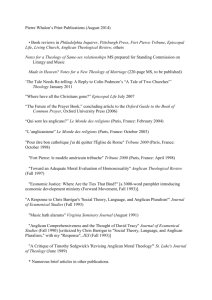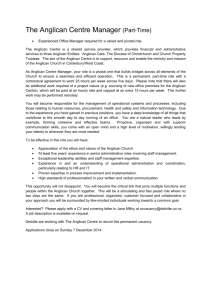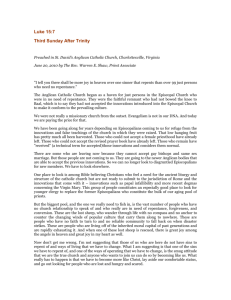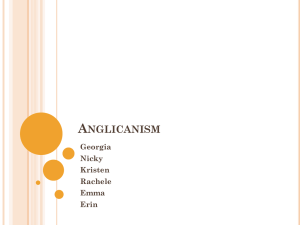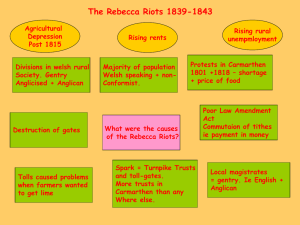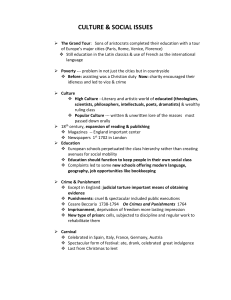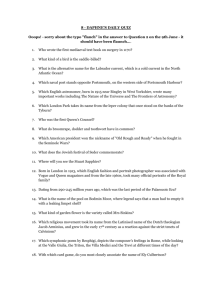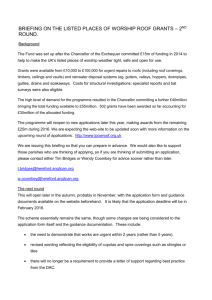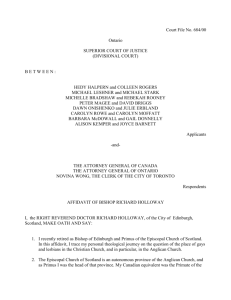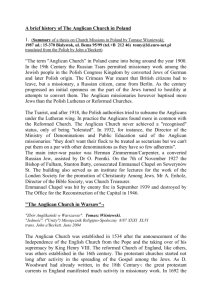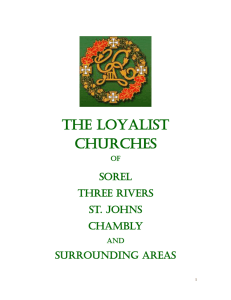accreditation - The Queens Foundation
advertisement
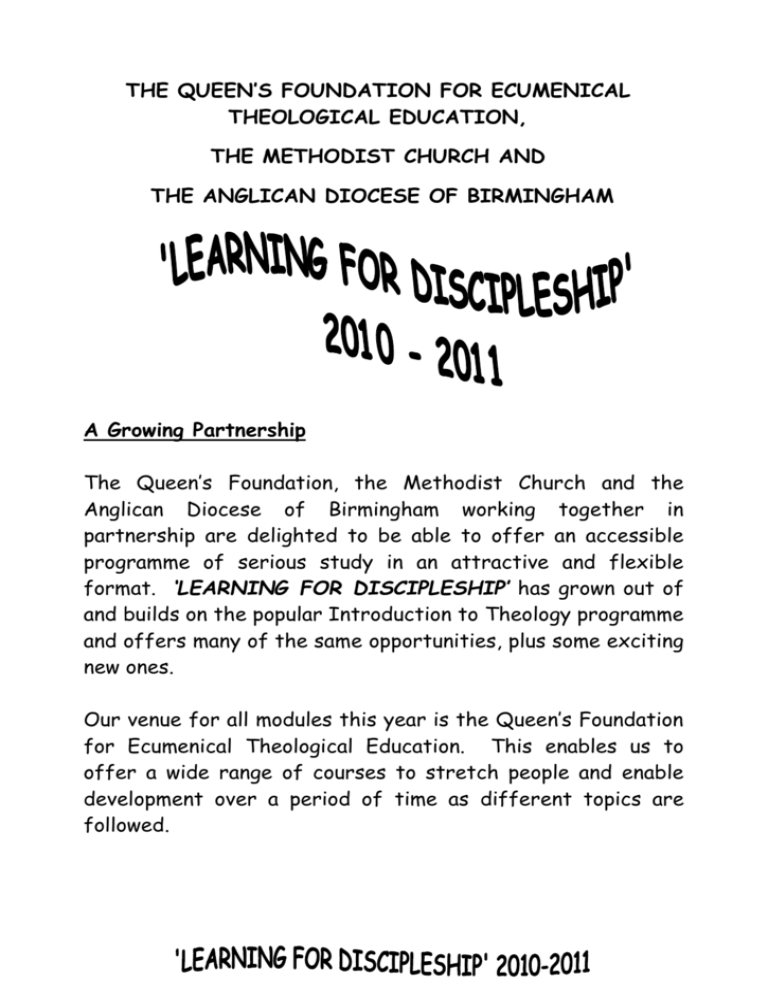
THE QUEEN’S FOUNDATION FOR ECUMENICAL THEOLOGICAL EDUCATION, THE METHODIST CHURCH AND THE ANGLICAN DIOCESE OF BIRMINGHAM A Growing Partnership The Queen’s Foundation, the Methodist Church and the Anglican Diocese of Birmingham working together in partnership are delighted to be able to offer an accessible programme of serious study in an attractive and flexible format. ‘LEARNING FOR DISCIPLESHIP’ has grown out of and builds on the popular Introduction to Theology programme and offers many of the same opportunities, plus some exciting new ones. Our venue for all modules this year is the Queen’s Foundation for Ecumenical Theological Education. This enables us to offer a wide range of courses to stretch people and enable development over a period of time as different topics are followed. Attendance You can take just a single module if you wish, or you can choose something each term to build up your own programme of study and you choose if you wish to do the assessed work. Sampling Academic Study Those who wish to complete a module, including the assessed work (which usually involves one essay totalling 3000 words) can pay an extra charge and have their work assessed by their tutor. University Credit If you attend more than 70% of the module and complete the assessed work to an acceptable standard, you will be eligible for University credit at Level One, pending University approval. At the moment, the way we register people for credit is under review. You will be informed of any changes in good time. In addition, successful completion of your first three modules for credit makes up the ‘LEARNING FOR DISCIPLESHIP’ award. The Bishop of Birmingham, alongside leaders from other churches, will present an Award to successful students at this stage. When? For most modules there are 10 weekly classes of up to 2½ hours starting April or May. Some classes are in the evenings and some in the daytime. Who is it for? The ‘LEARNING FOR DISCIPLESHIP’ programme is for anyone who wishes to try a more formal study course. (You might already have done the Anglican 3D Course or be a participant in the Methodist programme EDEV, or something similar). It is also helpful for Methodist Local Preachers and Anglican Readers and other lay leaders who are looking for development or refreshment. For anyone, here is a chance to discover new gifts and interests, to explore new directions, to increase your education and perhaps prepare for further studies. This is a challenging programme, but you do not need any special previous knowledge to join, at the level of a first year university course. The tutors are specialists in their own subjects, who are also experienced in helping adult students to learn. The only requirement when you start a module is that you should be serious about following it through to the end of the term. A new student on this programme said recently: ‘It has been inspiring and wonderfully enabling. I have really enjoyed all my modules. The approach of the tutors was so affirming and there has been so much encouragement to do my best. I’ve seen myself grow in my knowledge of scripture, and the ability to express myself in discussion and the essays’. What does it cost? For each 10-week module the fee is £80 which is payable at least 2 weeks before the course starts. If you wish to take the assessed work, this will be an extra £20 per module. As students enrolled at the Queen’s Foundation, you will have the opportunity to use the extensive library at Queen’s after attendance at a Library Induction Session. You may need to buy one or two books each term, and for some of the modules, there will also be a small library of books for borrowing. SUMMER 2011 15: THE THEOLOGY OF THE CHURCH OF ENGLAND, PAST, PRESENT AND FUTURE 10 Wednesday evenings: 7.30 – 9.30pm with coffee break Starting 4th May 2011 Tutor: Edmund Newey Anglican thought is famous for its diversity – evangelical, liberal and catholic – but can this diversity be held together and, if so, how? This module explores how the different streams of theology in the Church of England have interacted since the Reformation. Beginning with the thought of Thomas Cranmer, William Tyndale and John Jewel, we will then focus on the synthesis proposed by Richard Hooker at the close of the Sixteenth Century, uncovering the origins of the Anglican emphasis on the ‘threefold cord’ of scripture, reason and tradition. Tracing the emergence of different traditions in the Church of England, we will hear from contemporary representatives of evangelical, liberal and catholic Anglican thought. Finally we will look to the future prospects for Anglican theology in the light of the proposed global Anglican covenant. 16: READING JOHN’S GOSPEL Course now full 10 Thursday mornings 10.30am – 12.30pm Starting 28th April 2011 Tutor: Caroline Wickens John's Gospel offers a rich resource for our understanding of Jesus and what he meant to the early church. Yet the Gospel is often seen as difficult or overspiritual. This course aims to explore who Jesus is for John and his community, by paying close attention to key passages in the context of an overview of the shape of the Gospel and the development of significant themes. 17. REVELATION 10 Thursday evenings: 7.30pm – 9.30pm with coffee break Starting 5th May 2011 Tutor: Kevin Ellis The Revelation is one of the most intriguing books of the New Testament. The module will seek to put this apocalyptic text in its context, discerning some of its meanings for its earliest hearers and seek to understand it for today. We will look at, amongst other things, the relationship of the Revelation to other apocalyptic texts (e.g., Daniel, Ezekiel and 1 Enoch), to other parts of early Christianity, as well as how the text has been used and abused down the centuries. The module will suggest that the text should be read as a ‘political cartoon’, and in doing so show that it is a text that can generate hope for Christians today. HOW TO ENROL FOR THESE COURSES When you have decided which courses you wish to take, please fill in the Enrolment Form. There are a number of courses to choose from each term. Please put a tick by the course(s) you wish to take. If you are willing to take another option if your first choice is full, please indicate with a ‘2’, or ‘3’. These courses have proved very popular, and early booking is advised. As soon as we are able, we will confirm your place. FEES: For each course the fee is £80. You may pay for one term at a time. Please enclose the fee for the Autumn Term with your enrolment form Payment is due at least a month before the course begins. An account will be sent. Please send your enrolment form and course fee (cheques payable to BDBF) to: Andrea Stevens, Diocesan Office 175 Harborne Park Road, Harborne, Birmingham B17 0BH If you have any further questions please phone this office on 0121 426 0400 or contact us by e-mail l.howlett@birmingham.anglican.org ACCREDITATION To complete a course by having written work assessed by your tutor costs an extra £20 per course payable directly to The Queen’s Foundation. You will be informed at the start of the term when this payment is due. Please do not send this money with your enrolment form. HOW TO GET THERE The Queen’s Foundation for Ecumenical Theological Education is in Somerset Road, Edgbaston. Queen’s is located near to the Nuffield Hospital which is quite well signposted once you get close to Edgbaston. It can be reached by rail via the University station or local bus (no. 21) or by car. We will send you a map and travel directions when we confirm your booking. February 2011
